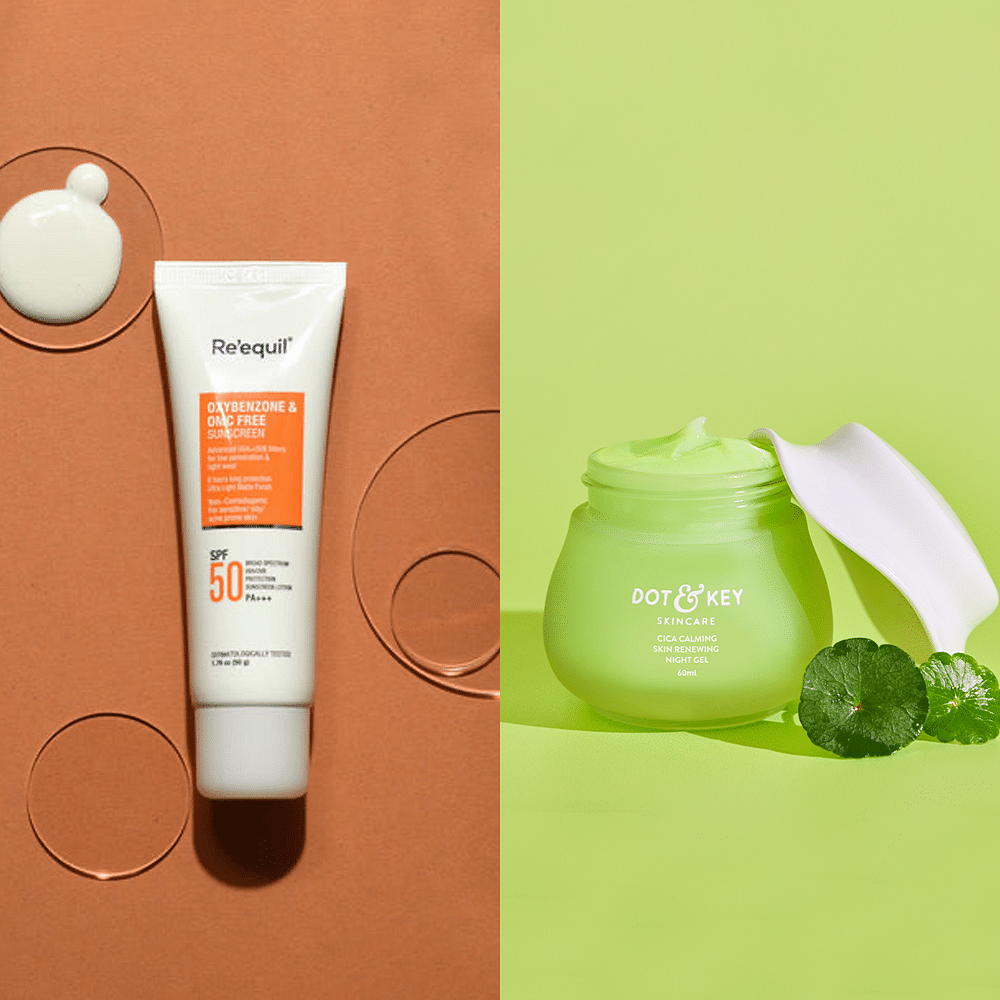Internationally renowned, celebrity cosmetic dermatologist Dr Chytra, who is also the founder and chief formulator of Skin Q - a homegrown, skincare brand that formulates products made with naturally found active ingredients, especially for Indian skin and skin colour, tell us ingredients we should look out for in skin care products. Plus, she share her tips, and brands which pack in these ingredients.
Celebrity Dermatologist Dr Chytra Tells Us 10 Ingredients Essential To Skincare
AHA: Glycolic Acid
Glycolic Acid is from a group of Alpha Hydroxy acids. Glycolic Acid is naturally found in sugarcane and belongs to natural skin smoothening and brightening ingredients. Glycolic Acid dissolves dead skin cells on the skin surface, making the skin smoother. It improves skin texture and tone, increases cell turnover, and hence improves the appearance of skin blotches and open pores. This makes it one of the essential skin brightening ingredients used in most skin brightening skincare. It helps reduce skin tan and fade pigmentation. It has been used in body creams for its exfoliating properties, and studies show that regular use of Glycolic Acid can stimulate collagen production.
Pro Tip: Use an exfoliator or mask with Glycolic Acid 2 – 3 times a week on your skin for 5 - 10 mins rather than a daily cream as using Glycolic Acid daily can make skin photosensitive.
Shop This: Skin Q Glow Brite Mask, Minimalist AHA BHA peeling solution
Lactic Acid
Lactic acid is an alpha hydroxy acid. It is a moisturising exfoliant that reduces skin flakiness, smoothens skin, reduces pigmentation blotches and softens skin. Typically used in skin brightening and skin smoothening skincare, this one is a must have in your daily regime.
Shop This: Glow Detan Elixir Serum, Kosmoderma Ultra Moist Boost, Minimalist Lactic Acid Serum
Splurge: Sunday Riley all-in-one Lactic Acid
Hyaluronic Acid
Hyaluronic Acid is one popular natural skincare ingredient! Any serum or gel that deals with hydration contains Hyaluronic Acid. It is a natural product in the body that depletes with ageing. It is a product that is hydrophilic which means it can attract water. Hyaluronic Acid is capable of attracting up to 1000 times its weight in water and retaining the moisture within the cells. It forms part of the skin's natural barrier, the hydro-lipid membrane and is vital for maintaining skin health. Hyaluronic Acid hydrates the skin, and plumps up the skin cells making the skin look hydrated and healthy. It not only helps your skin look hydrated by reducing lines and dullness, but is also critical for skin healing. This makes Hyaluronic Acid one of the most vital hydrating and anti-ageing ingredients.
Pro Tip: For dehydrated skin, use Hyaluronic Acid in a gel form to boost the skin hydration. It can be used on closed wounds/burns to help skin heal. Sodium Hyaluronate is the other form of a humectant; it is absorbed deeper than Hyaluronic acid. A serum that contains both is ideal.
Shop This: SkinQ Hydra Elixir, The Derma Co Hyaluronic Acid Serum, Simple Skin Booster Serum, 3% HA, L'Oreal Revitalift.
Niacinamide
Niacinamide is now the 'flavour of the moment' skincare ingredient. A form of Vitamin B3, this one is anti-inflammatory, calms and soothes irritated skin (which most people face), reduces skin redness, hyperpigmentation and skin blotches. It is a popular natural skincare ingredients being used in skin brightening creams these days. Niacinamide helps reduce the skin's water loss. Due to its anti-inflammatory products, Niacinamide is used in anti-ageing cream as well as in anti-acne and rosacea creams.
Pro Tip: Niacinamide can be used daily for sensitive skin, acne prone skin and skin that easily tans to reduce pigmentation.
Shop This: SkinQ Acne Control Mask, SkinQ Acne Control Elixir, Plum Niacinamide serum, Earth Rhythm Niacinamide moisturiser.
Ceramides
Ceramides are natural skincare ingredients and are part of the skin's natural barrier, the hydro-lipid membrane. Ceramides are lipids (fatty substance), hence they act as a sealant by keeping the skin protected by preventing the entry of harmful stuff/irritants and by maintaining the hydration within the skin due to its moisture sealing capacity. It is one of the best moisturising ingredients for dry skin, eczema-prone skin and flaky skin.
Pro Tip: Use a moisturiser with Ceramide to restore the skin barrier. This can be used daily for all skin types.
Shop This: SkinQ Moisture Balm, Kosmoderma Moisture Boost, Nykaa SkinRX ceramide serum, Chemist at Play Body Lotion
Retinol
Retinol has been around for ages and is one of the most well known anti-ageing ingredients. It is a Vitamin A derivative that increases cell turnover, specifically helping to reduce dullness of skin, and the appearance of open pores and fine lines. Retinol is an active anti-ageing ingredient that can penetrate the deeper layers of the skin. Retinol plays a large role in acne and oil control of the skin. Hence it can also be irritating to the skin surface. Sensitive skin can get red with constant use. Tretinoin is the more potent version of Retinol and must be prescribed by a dermatologist for use. Retinol Liposomes are one of the ways to introduce retinol to the skin without surface irritation, and are suitable for Indian skin
Pro Tip: Use Retinol at night on alternate days and ease your skin into the routine. Do not use Retinol during the day, as it is photosensitive. Indians over the age of 30, should get into a habit of using retinol in their skincare 2 – 3 times a week for skin maintenance.
Shop This: SkinQ Acne Oil Control Elixir, Re'equil Retinol Cream, Olay Retinol Cream, The Derma Co Retinol Serum
Peptides
Peptides are the latest discovery in anti-ageing ingredients. They are active agents that trigger cells or signal cells for specific functions like collagen-building and anti-inflammatory. Peptides are present in every cell of our body and are essential for the smooth functioning of the cells. There are various kinds including carrier peptides, signalling peptides, and hormone peptides, and based on the type they have varied functions. The most common function of peptides in skincare is for boosting collagen production. It is commonly prescribed by dermatologists to prevent collagen degeneration. Peptides are potent natural anti-ageing ingredients with anti-wrinkle properties.
Pro Tip: The pure peptides are more expensive, and hence anti-ageing creams with real peptides are more costly than others. So, expensive is better in this case!
Shop This: Minimalist Multi Peptide Serum, Olay Regenerist pack, Dr Sheth's Peptide Serum
Antioxidants: Vitamin C
Vitamin C is one of the most recognised photo-protective and best anti-ageing ingredients. When used daily in the day time, it reduces the skin damage caused by UV radiation or Sun and boosts sunscreen activity on the surface skin. Vitamin C helps boost collagen production. The most active form of Vitamin C is 15% L Ascorbic Acid and has the highest action on skin. The other forms are less active but more stable. L Ascorbic is most potent and more expensive
Shop This: SkinQ Vit C Glow Serum, Dot & Key Vit C Moisturiser
Splurge: Sesderma C Vit Liposomal Serum, Murad Vit C Brightening Serum
Antioxidants: Vitamin E
It is one of the moisturising natural anti-ageing ingredients that acts as a skin surface protective barrier and also aids skin repair functions. It's photo protective but less than Vitamin C. Vitamin E is typically helpful for dry flaky and dull sensitive skin due to its non irritant nature.
Shop This: Body Shop Vitamin E Serum, The Derma Co Vitamin E Serum, Earth Rhythm Vitamin E Concentrate
Zinc PCA
Zinc PCA is Zinc with trace element carboxylic acid. It’s a zinc salt. Effective for treating acne, breakouts and controlling pimples. This helps reduce oil secretion and supports general healing of the skin. It's is ideal to use in serum and masks for skin maintenance.
Pro Tip: Ideal for acne-prone skin
Shop This: SkinQ Acne Control Wonder Mask, Kaya Salicylic Acid Zinc PCA Serum, Bodywise Zinc PCA Serum


